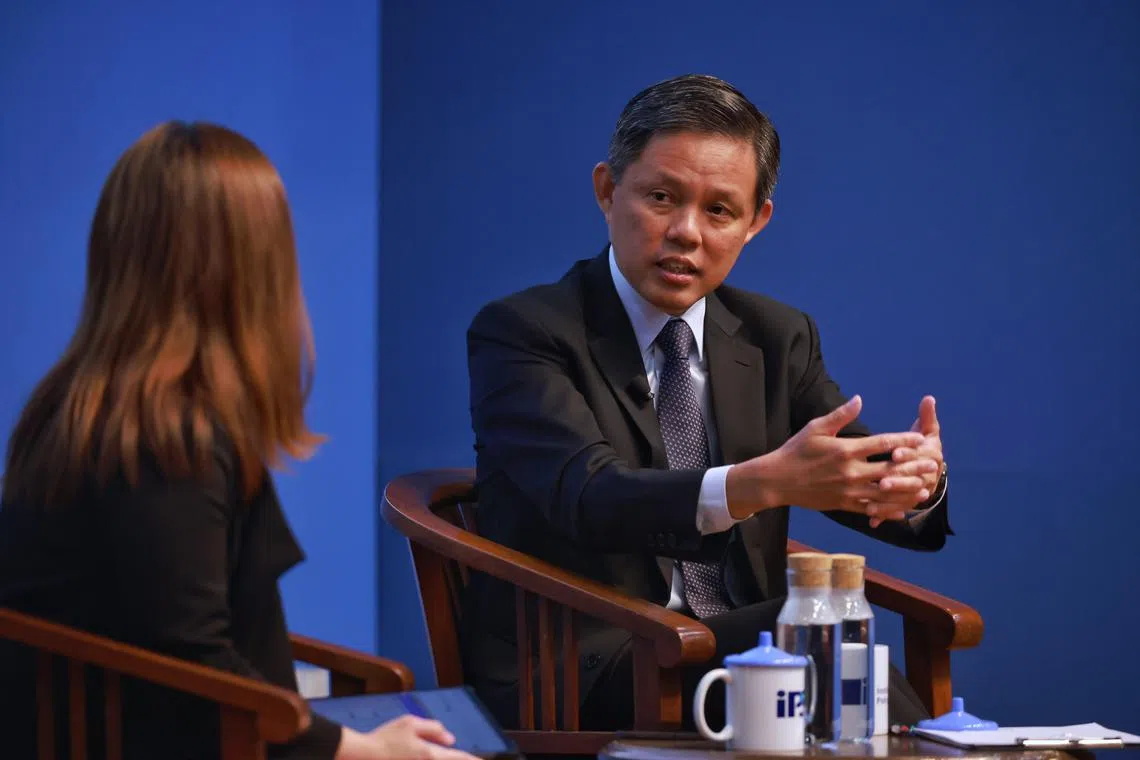Focus on 5 key areas to keep education system relevant in uncertain world: Chan Chun Sing
Sign up now: Get tips on how to help your child succeed

Education Minister Chan Chun Sing (right) speaks during a Q&A session at the Institute of Policy Studies, on Jan 5, 2023.
ST PHOTO: JASON QUAH
SINGAPORE - Boosting lifelong learning and closing learning gaps early in life are among the five key areas of focus needed to ensure Singapore’s education system stays relevant in an increasingly uncertain and challenging world.
The urgency for Singapore’s education system to evolve quickly is clear and more must be done, said Education Minister Chan Chun Sing on Thursday.
The areas of focus he highlighted include ensuring the individual needs of students are met and relooking industry and institutional practices.
He was speaking at the first session of Singapore Perspectives 2023, a conference organised by the Institute of Policy Studies on the theme of work. About 750 attendees signed in for the online session on Thursday morning.
Customising learning and closing the learning gap early in life
Stronger investments will be needed in the early years, especially for less privileged children of families with higher needs, said Mr Chan. Much has been done in the last 15 years, and more will be done.
He said this is important as there is increasing evidence that the learning and development gap must not be allowed to widen from a young age. “Once the development gap sets in, the amount of remediation required is inordinately high and it becomes difficult to rectify,” said the minister.
“We will examine afresh new ways to reach out to these children and families, structure the support for them holistically – including both education and social (aspects) together, so that no one is left behind at the start.”
Mr Chan welcomed partnerships with a wider range of people and private organisations to pilot new models to meet differing needs.
Technologies in artificial intelligence and deep analytics must also enable the system to better customise learning approaches for every child, he said. Students must continue to have diversity in pathways and subject choices through greater flexibility in subject levels and customising of degree programmes.
With that, aptitude-based admissions that take students’ potential and interest into account will become a greater part of Singapore’s selection and placement system, Mr Chan added.
Moving beyond the first 15 years to the next 50 years
Individuals must look to new benchmarks of success, such as having a spirit of inquiry and a desire to create new knowledge and value, said Mr Chan.
Companies cannot and must not passively wait for the “perfect worker” to be developed for them, he said. They must be active partners in shaping students’ interests and skill sets early, and must work with academia to train workers, even after they join the workforce, he added.
“I can understand the difficulties in committing to train workers, given the uncertainties and disruptions in our industries. But the more we don’t do this well and together as a system, the more we will end up poaching from one another in a stagnant talent pool.”
Institutions also need to redesign teaching methods to meet the needs of adult learners so that they can learn flexibly amid competing responsibilities, he said.
Getting academia and industry to work more closely together
From creating new value at the intersection of conventional disciplines to better translating research into enterprises, tighter industry-academia tie-ups at all levels are needed, said Mr Chan.
“This is hard work required of our institutions and faculties. It requires the skill sets to collaborate with others beyond our discipline and comfort zone,” he said.
“When industry and academia co-design, co-develop and co-deliver the pre-employment and continuing education modules for both students and adult learners, we refresh the skills of our people much faster,” he said.
He added that work-study degrees and diplomas will become more common as part of efforts to expand the involvement of industry partners in co-delivering skills training.
Getting whole of society involved
Mr Chan said: “MOE has never believed that we can ever change society or even develop the next generation alone. To truly enhance the diversity of strengths and broaden our definition of success, we must work with parents, community partners and industries.
“We must also work with our industry to close the skills gap and remunerate according to contributions rather than just credentials. If we do not collectively narrow the remuneration gap between graduates and non-graduates, diploma holders and non-diploma holders, no amount of preaching the multiple pathways of success will ever work.”
Investing in teaching fraternity
Educators, too, need to keep their skills updated, said Mr Chan.
“Beyond transmitting knowledge, they are facilitators of discovery and learning. Beyond academics, they provide emotional support for our children and families with higher needs,” he said.
“Beyond engaging mainstream students, they have to reach out and nurture students with special educational needs.
“Beyond mastering tried-and-tested pedagogies, they now have to explore and develop new pedagogies and andragogies (adult learning) to deliver blended learning.”
Even educators at institutes of higher learning must continue to learn, and the Institute for Adult Learning will be the third pillar of the teaching fraternity’s professional development – in addition to the National Institute of Education and National Institute of Early Childhood Development, which look after school and pre-school educators.



